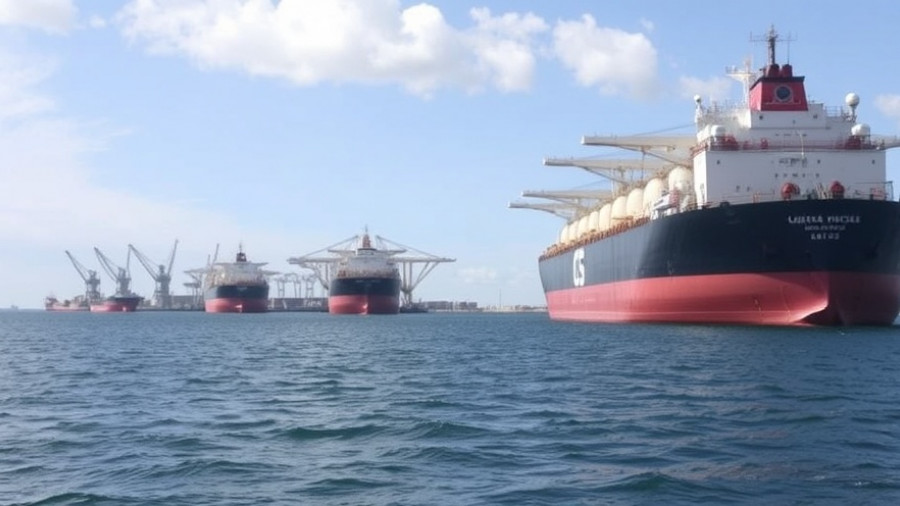
US LNG Terminals: A Troubling Environmental Compliance Record
In a startling revelation, all seven operational liquefied natural gas (LNG) terminals across the United States have been found to violate federal pollution limits in recent years, according to a report from the Environmental Integrity Project (EIP). This analysis comes amid the Trump administration's rush to approve new LNG export terminals as part of an aggressive push to increase the supply of domestic gas to Europe and Asia.
As America continues to position itself as the world's largest LNG exporter, environmental assessments indicate a troubling trend in non-compliance with established air and water pollution regulations. The majority of these terminals, which include famed names such as Sabine Pass and Calcasieu Pass in Louisiana, have consistently failed to meet the standards set by the Clean Air Act and the Clean Water Act.
Four Major Violators Making Waves
Of particular concern are the Sabine Pass and Calcasieu Pass terminals, which have faced relentless compliance issues, particularly with air pollution regulations since 2022. These terminals, alongside Texas's Freeport LNG terminal, which had a notorious explosion in June 2022, are emblematic of a broader compliance epidemic affecting the industry. The Freeport facility has accumulated over half of the penalties levied against LNG operators in the country due to its frequent regulation breaches.
The implications of this poor record extend beyond simple violations; they pose risks to surrounding communities and ecosystems. Around 14,000 tons of unpermitted emissions have been reported from these terminals, reflecting a legacy of accidents and operational failures.
Environmental Concerns Amid Expansion Plans
Despite these infractions, the LNG industry continues to push for major expansions. This decision comes as no surprise; the industry's lucrative promises of energy independence and economic growth often overshadow pressing environmental concerns. However, as experts from the EIP warn, the continued hyping of LNG as an environmentally friendly alternative lacks substantive backing given this compliance record.
Companies have been granted exceptions and lowered standards to allow for increased emissions, leading to widespread skepticism. The Louisiana Department of Environmental Quality, for instance, has amended permits to permit higher emissions despite ongoing violations. Such actions have raised alarms among environmental advocates like Jen Duggan from the EIP, who argues that the regulatory bodies should rather be pulling back on new terminal approvals.
The Bigger Picture: A Global Environmental Crisis
These findings align with a broader narrative about the clash between energy expansion and environmental responsibility. As the world grapples with climate change, emphasizing sustainable practices is essential, especially with federal policies often aligning with economic incentives over environmental protection. In light of recent data suggesting a surge in methane emissions and climate-related disasters, the urgency we face calls for a rethink of prioritizing fossil fuel infrastructure over clean energy solutions.
To worsen the situation, new satellite evidence shows a stark lack of responsiveness from LNG companies to reported pollution incidents, reflecting a culture of negligence towards environmental safety. This presents a dual challenge: one of enforcement and one of public accountability.
What Lies Ahead for LNG in the United States?
The LNG industry faces a pivotal moment. As the Biden administration injects a cautious approach to energy export regulation, the future of these terminals hangs in the balance. With talk of potential expansions and new approvals, stakeholders will need to bridge the gap between energy needs and ecological imperatives to find solutions that promise sustainable development.
Making Informed Decisions for a Sustainable Future
As homebuyers, sellers, and property investors, it is pivotal that you are informed about the state of energy production, especially as it directly impacts property values and community health. Understanding the environmental compliance of infrastructures such as LNG terminals will serve you well in making decisions that not only seek profitability but also prioritize sustainability.
The growing awareness of environmental issues among consumers creates an opportunity for you to advocate for eco-friendlier practices while investing in properties. Engaging in dialogue with local representatives about sustainability standards can promote lasting change and protect the investments you hold dearly.
 Add Row
Add Row  Add
Add 





Write A Comment